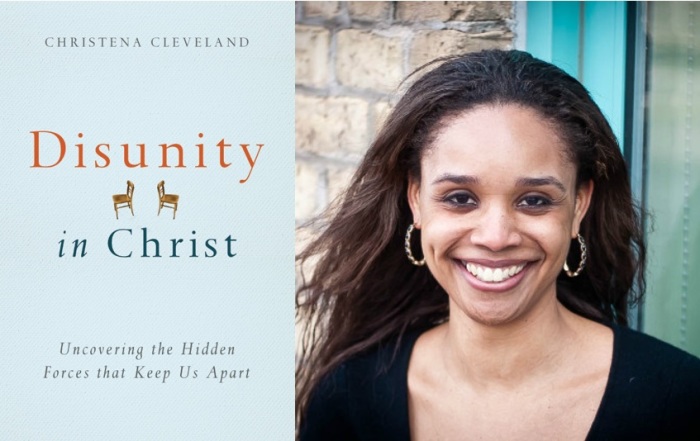Why Is It So Hard for Christians to Get Along?
Christena Cleveland Chooses Thorny Issue for Focus of New Book Release

The foundations for Christena Cleveland's new book, Disunity in Christ: Uncovering the Hidden Forces that Keep Us Apart, began when she was eight-years-old. As a child, growing up in her father's "a quarter black, Hispanic, Asian and white" church plant in the culturally heterogeneous San Francisco Bay Area, this was Cleveland's reality.
"It was normal for you to interact with people who were different. It was normal for cultural conflicts to come up and for you to work through them, rather than run away from them. It was normal for me to sing worship songs outside of cultural comfort zone," Cleveland told The Christian Post. "Church was an adventure."
But as Cleveland, who attended Dartmouth College in New Hampshire for undergrad and subsequently entered a doctorate program at University of California, Santa Barbara, left her childhood behind and began to move around the country, she quickly saw that many American churches had nowhere near the diversity she had taken for granted as a child.
While Cleveland had "always been passionate about reconciliation," she did not see the connections between her love of bringing different cultural, ethnic and denominational groups together, and social psychology, her field of study, until late in the Ph.D. process.
"I was sitting there studying group processes for my dissertation…I guess I just had a light bulb moment one day where I realized there was all this research in social psychology that helps us understand why groups work well and what happens when they don't and no one had ever taken the time to think about it in the context of the church," said Cleveland.
Expounding on that connection is what has formed the foundation of Cleveland's current work where she divides her time between teaching college courses, blogging, and working with pastors and church leadership teams about how to fulfill "the mandate of reconciliation."
Not surprisingly, Cleveland's new book is a discussion of the psychological reasons that keep so much of American Christian churches "90 percent homogenous."
One of factors inhibiting more unity, asserts Cleveland, is the "gold standard," or idea that "we're going to grade everyone on a measuring stick that's made in our image."
The root of this subconscious behavior, says Cleveland, is that humans spend the majority of their time with others who are just like them and any interactions with others who are different are "not very meaningful."
"We start to think that our way of doing church, our way of perceiving other people, our way of interpreting Scripture is the only way, it's the gold standard," said Cleveland.
This homogeneity breeds its own positive feedback, says Cleveland, where "everybody around us is singing the same tune and patting us on the back for having these perspectives. If we spend enough time with people just like us, we really start to think we really are the center of the universe."
"And so, [we begin to believe] if anybody else is right or wants to be relevant they must be like us. So we actually become intolerant without even knowing it, without even trying to be," she said.
"We are drawn to things that are relevant to ourselves and drawn to things that are important to us, so to the extent that people adhere to those standards, we're going to like them more," said Cleveland.
Cleveland, who encourages individuals to break out of the gold standard mentality by spending extensive time with those who have different backgrounds and beliefs, said that while she's not "advocating for people to relinquish their beliefs," she's interested in challenging people to be more humble.
"The vast majority of the theological issues that we have, it's just so defensive and we're just digging our heels in. It's very 'my way or the highway.' I see that as the problem, not the disagreement. I think disagreement is healthy, it's wonderful," she said.
Cleveland also noted that Christians have difficulty understanding the diversity that Paul discusses in 1 Corinthians 12:12 (NIV), where he explains the concept of the Body of Christ: "Just as a body, though one, has many parts, but all its many parts form one body, so it is with Christ."
Instead, Christians often "perceive other people of different theologies as stick figures" even though "by definition the hand is going to have a different perspective on the world than the foot will."
Rather, Cleveland said, individuals should "truly listen to others and to give people the benefit of the doubt."
Cleveland acknowledges the difficulty of the work she is challenging Christians to and hopes that her book will give individuals action steps on how to reach out to groups of other denominations, races, socioeconomic statuses and cultures.
"Reconciliation work is hard. I think it's hard because there is a spiritual battle at play. But it's also hard because we just don't understand human processes," said Cleveland. "We don't understand the way that we think for the most part. So sometimes you see churches with such good intentions that keep running to these walls."
"I think the work that I do is giving them a map. 'Here's what to expect. Here's what you're likely to do. Here's how to avoid that. Here's how to build a bridge over that wall so that you can actually get over it and keep moving along the maze,'" said Cleveland. "This work is really hard and it's really easy to hit dead ends without someone to guide you."





























